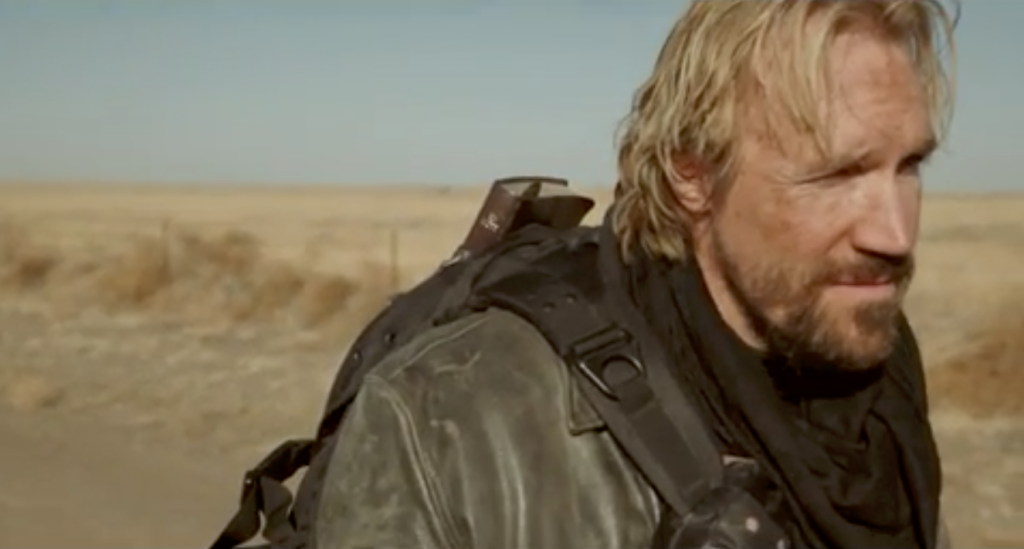What’s the Point? by Tim Acheson
16 Jun
Even as I would continually pause my viewing of Revelation Road: The Black Rider to listen to Indie music or watch a clip from Mad Max: Fury Road, keeping with the Bible’s command to only concern oneself with what is excellent and praiseworthy (Philippians 4:8), there is this much I can say not just for The Black Rider, but for the Revelation Road trilogy as a whole: I consider it a guilty pleasure. Not as offensive as the God’s Not Dead duology but, with its writing, acting, directing and special effects, nowhere near reaching the heights of post-apocalyptic fare like The Book of Eli, The Revelation Road films are, at their best, films to be laughed at in the company of friends, in the tradition of so-bad-it’s-good films like Birdemic: Shock and Terror.
A scene where a cannibal, slipping on a wet floor, hits his head on a table and is knocked unconscious provides unintentional comedy and illustrates how far Christian films will go to be “clean.” Which leaves me scratching my head. The Christian faith is anything but “family-friendly” – for example: Judges 3:21 – so why the insistence that art made by Christians be?
The Black Rider continues the story of Josh McManus (David A.R. White) as he tries to save the souls of those left behind by the Rapture. Returning from the previous films are Bruce Marchiano as Jesus, and Brian Bosworth as biker gang leader Hawg. New to the cast is Christian film star Kevin Sorbo as Honcho, an outlaw with a bad Australian accent who further accentuates the parallels between Revelation Road and Mad Max, which takes place in Australia. Hindering Josh on his mission to save the life of a dying young woman whom he has rescued from her kidnappers are Drake (James Denton), Salinas (Michael Bailey Smith) – who gives off a Vincent D’Onofrio vibe – and a number of dialogue and technical issues not present in the previous films. If excellence declares the glory of the Lord, as Psalm 19:1 attests, than The Black Rider is not, despite its preaching, declaring His glory.
I can look past The Black Rider‘s on-the-nose writing, laughable sound effects, poor special effects, and generally poor acting. But the more I think about its ending, the more I am tempted to see it as not so bad it’s good, but just plain bad. I would argue that it’s a worse ending than the deathbed conversion of Professor Radisson in God’s Not Dead. The climax of the film involve’s a character’s choice. I consider the choice they make to be selfish. It negates much of the film. Without getting into spoilers, the question on my mind as the credits rolled was, “What was the point?” God is so involved in the universe of the Revelation Road trilogy – through His servant “The Shepherd” people are protected from the gangs roaming the land – that it makes me think, “Why can’t God just fix everything?” When the story you’re telling ultimately hinges on the actions of its perfect deity, and not on the actions of its imperfect human beings, it’s time to think back on what you learned in Introduction to Screenwriting.




No comments yet